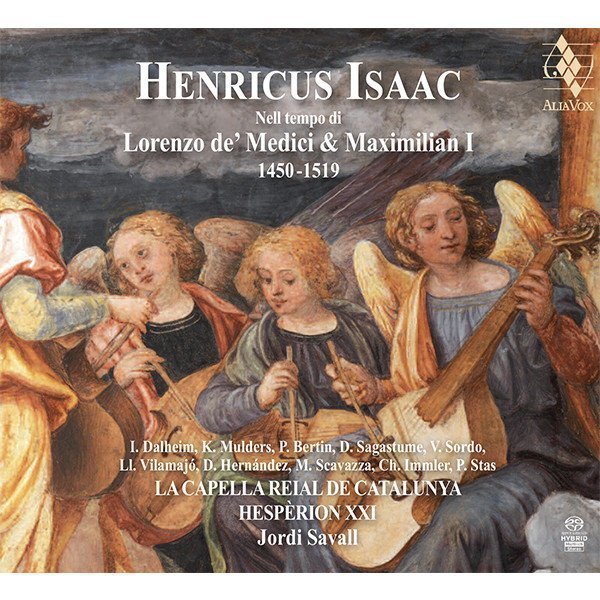HENRICUS ISAAC
Nell tempo di Lorenzo de Medici & Maximilian I
Hespèrion XXI, Jordi Savall, La Capella Reial de Catalunya
17,99€
Splendour of the Humanist Renaissance before the Protestant Reformation
With the release of this new recording dedicated to Heinrich Isaac, in memory of the 500th anniversary of his death, ALIA VOX pays tribute to one of the greatest Renaissance composers. Heinrich or Henricus Isaac, as we shall call him, was born in Brabant but spent most of his life travelling around Europe, from his native Flanders to the court of Burgundy, Austria, and then Italy and Germany. At the invitation of Lorenzo the Magnificent, in 1488 he moved to Florence, the city he continued to call home through all his travels, and where he became a highly regarded and much admired member of the Medici court. Some years after the death of Lorenzo the Magnificent in 1492, he also became the principal composer at the court of Emperor Maximilian I of Habsburg (1497) until his death, and, notwithstanding his extensive travels, spent most of his time in Florence.
Splendour of the Humanist Renaissance before the Protestant Reformation
Homage to one of the greatest Renaissance composers
With the release of this new recording dedicated to Heinrich Isaac, in memory of the 500th anniversary of his death, ALIA VOX pays tribute to one of the greatest Renaissance composers. Heinrich or Henricus Isaac, as we shall call him, was born in Brabant but spent most of his life travelling around Europe, from his native Flanders to the court of Burgundy, Austria, and then Italy and Germany. At the invitation of Lorenzo the Magnificent, in 1488 he moved to Florence, the city he continued to call home through all his travels, and where he became a highly regarded and much admired member of the Medici court. Some years after the death of Lorenzo the Magnificent in 1492, he also became the principal composer at the court of Emperor Maximilian I of Habsburg (1497) until his death, and, notwithstanding his extensive travels, spent most of his time in Florence.
An extremely prolific and innovative composer, Isaac left one of the most important musical legacies of his day and was distinguished by his absolute mastery of the art of counterpoint and polyphony – an art in which he was supremely gifted, both in his religious works and his secular songs and instrumental music. We echo the opinion of Anton Webern, who observed that Isaac’s compositions, which in terms of their absolute mastery of counterpoint are comparable to those of other illustrious Flemish composers such as Pierre de la Rue, Jacob Obrecht and Josquin des Prés, clearly stand out from his contemporaries in “the unfailing and exceptional vivacity and independence of the voices” (Anton Webern, 1906) in his many beautiful, complex forms of polyphony.
+ information in the CD booklet
JORDI SAVALL
Oslo, 19th March, 2017
Translated by Jacqueline Minett







Share